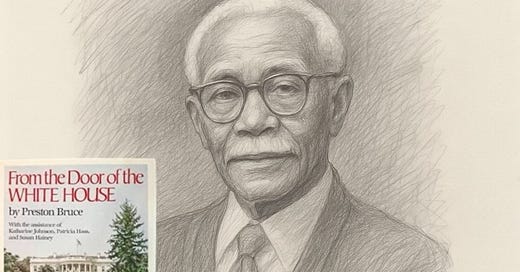It started, as so many meaningful discoveries do, with a book. I was reading John Lewis: A Life by David Greenberg, trying to trace the quiet courage of a man who had put his body on the line for civil rights and moral dignity.
But somewhere in a single passing sentence — I stumbled on a name that stopped me in my tracks: Preston Bruce.
I didn’t know the name then, but it stayed with me. Something about it rang with presence. Preston Bruce. Black man. Doorman. The White House. A few Google searches later, I stumbled through a new door entirely.
What I discovered was a life lived with steadfast grace and humility — a man whose presence spanned five presidencies, from Eisenhower to Ford.
Life and Presence
Preston Bruce wasn’t elected, and he never made headlines. But for 24 years, he stood at the threshold of American power, literally opening the door to presidents, dignitaries, grieving widows, secretaries of state, and countless ordinary citizens. He was the first face you saw when you entered the White House, and sometimes, the last touch of humanity before you left it.
Born in McColl, South Carolina, in 1906, Bruce was the son of a sharecropper and a barber — modest beginnings that echoed the lives of many Black Americans navigating the early 20th century. He moved to Washington, D.C., in the 1930s and eventually landed a job as a messenger for the Treasury Department. In 1953, he became the White House doorman — a role he would hold until his retirement in 1977.
But “doorman” doesn’t quite do justice to what Bruce became.
He was a presence. A steward of decorum. A keeper of secrets. A quiet witness to history. He greeted foreign dignitaries, introduced guests to the president, handled sensitive morning memos, and even trained military aides on etiquette. His duties were logistical, yes, but they were also ceremonial and, often, deeply emotional.
When John F. Kennedy was assassinated in 1963, Bruce was the one who comforted Jackie Kennedy and Robert F. Kennedy in the elevator. When Nixon resigned in 1974, Bruce was there, standing in the doorway of loss and shame, offering something steady. Through triumph and tragedy, he never faltered.
What’s more, Bruce had relationships with the first families he served. JFK used to call out, “Hello, Bruce,” every time he passed. He reportedly once introduced Bruce by saying, “He runs the place.” That kind of acknowledgment — subtle, human, almost whispered — speaks volumes.
The Book Behind The Door
In his 1984 memoir, From the Door of the White House, Bruce shares these moments not with boastful pride, but with the dignity of someone who loved his work and respected the lives that passed through it.
The book is a short 176 pages and is written with a clarity that feels almost meditative. It’s geared toward young readers, yet it carries the soul of an elder telling stories on a front porch.
The chapters are organized not by subject matter, but by presidency. Each section reveals Bruce’s impressions, interactions, and reflections on the families he served.
From Eisenhower’s formal bearing to Kennedy’s vibrancy, from Johnson’s Southern flair to Nixon’s cool distance and Ford’s everyman steadiness, Bruce quietly illustrates the humanity beneath the headlines.
The most stirring aspect of the book isn’t any one story, it’s the cumulative effect. You begin to realize: here was a man who stood still while the world turned around him. Who watched the pendulum of history swing wildly and yet never lost his center. He never claimed power, but he wielded something rarer: presence.
Bruce passed away in 1994 at the age of 88. In his final reflections, he wrote, “Each (White House) family affected me deeply… In my heart, they became my family, my charges.” It’s that kind of tenderness that turns a job into a vocation, a threshold into sacred space.
I never expected to find Preston Bruce while reading about John Lewis. But that’s how books work — one door opens, and behind it is another, and another still. These stories, hidden in the margins, folded between the pages, are the quiet architecture of our collective memory.
Preston Bruce didn’t hold office. He held space. And sometimes, that makes all the difference.
If you are finding “Black Black, Black Minds” to be a valuable resource in learning about Black History , then please consider supporting my work by subscribing as a paid member or tipping me some dirty chai latte love.
No paywalls—just raw, well-researched feature articles delivered straight to your inbox. Every contribution helps keep this journey alive. you contributions will be greatly appreciated.
Diamond Michael Scott, Global Book Ambassador, The Great Books, Great Minds Family of Books





Respect! Thanks for bringing Preston Bruce's life to our attention!
Was the movie "The Butler" inspired at all by his story? It seems there are parallels.